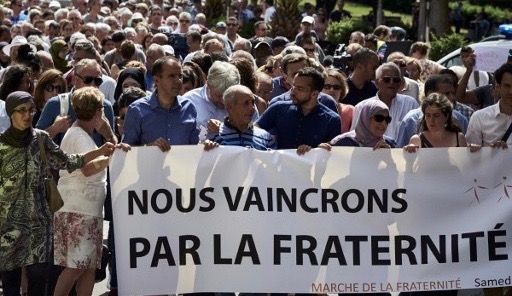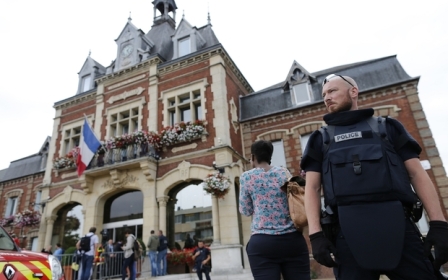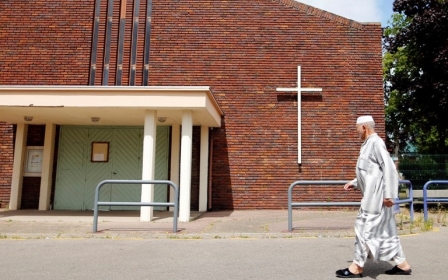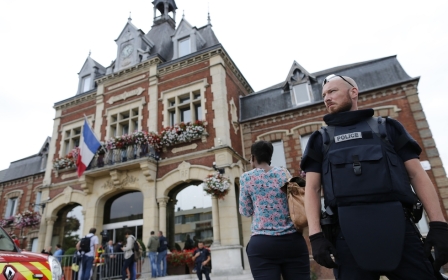Christians, Muslims mourn murdered French priest in ‘brotherhood march’

By Sophie Deviller
with Myriam Chaplain-Riou in Lyon
Muslim and Christian groups came together on Saturday to mourn a French priest murdered by Islamic State-inspired attackers, as authorities charged a man in connection with the brutal church attack that rocked the nation.
A shellshocked France is still coming to terms with the killing of the clergyman at the altar in his church, sparking fears of tensions between religions in the secular nation.
In a bid to forge togetherness between the communities, a "brotherhood march" was held in the southeastern city of Lyon, supported by a regional Muslim council and a Catholic group.
Some 400 people marched in silence, as mourners at the front of the crowd carried banners that read: "This is not a religious war" and "We are all brothers and sisters."
"We think it is crucial to leave no room for resignation, resentment or fear, and to take a stand for togetherness," Abdelkader Bendidi, who heads the regional Muslim council, said in a statement.
"Let's not give the agents of terror a second victory by giving in to hate," said Azzedine Gaci, a local imam.
'Criminal conspiracy'
"It doesn't matter what our religious beliefs are, or if we have none at all. These attacks won't divide us. Instead, they will unite us around one idea: reconciliation," said Foucauld Giuliani, of a Catholic group.
A church in the southwestern city of Bordeaux said it would hold a non-denominational vigil for the 85-year-old Jacques Hamel, who had his throat slit by IS-inspired teenaged attackers.
And prayers were also planned at the Saint-Etienne church where the killing took place as Hamel was celebrating mass on Tuesday.
Police were still trying to piece together links to the two 19-year-olds who carried out the attack - Adel Kermiche and Abdel Malik Petitjean - both of whom were on intelligence services' radar and had tried to go to Syria.
On Friday, authorities filed charges against a 19-year-old man accused of "criminal conspiracy with terrorists" after police discovered a mobile phone video of one of the assailants at his home.
Police were still questioning Petitjean's cousin and a Syrian refugee, after a photocopy of his passport was found at Kermiche's house.
A 16-year-old was released but could ultimately face a separate investigation for possessing militant propaganda, authorities added.
A source close to the enquiry said that a 17-year-old, who had tried to travel to Syria with Kermiche, was arrested in Geneva and sent back to France just a few days before the attack.
However, "nothing suggests he was in any way implicated in the attack" at this stage, the source added.
Both French Prime Minister Manuel Valls and Interior Minister Bernard Cazeneuve have come under fire for perceived security failings.
Valls has said he would consider a temporary ban on foreign financing of mosques, urging a "new model" for relations with Islam after a spate of militant attacks.
France has just over 2,000 mosques, for Europe's largest Muslim population of about five million.
Some mosques were financed by Saudi Arabia and other Gulf or North African countries, according to local media reports.
After meeting with French President Francois Hollande earlier this week, the rector of the Paris Mosque Dalil Boubakeur himself suggested "certain reforms of the institutions" of Islam.
'Peace, it's what we want'
Since the assault, harrowing details have emerged about what happened in the church as well as a chilling warning from one of the attackers.
On Friday, L'Express magazine revealed that Kermiche had described the modus operandi of the attack on the encrypted messaging app Telegram.
"You take a knife, you go into a church. Bam!" says the message recorded just a few days before the attack.
Meanwhile, two elderly nuns who were in the church at the time of the attack said the assailants "smiled" and spoke about peace.
Sister Helena said when asked if she was familiar with Islam's holy book, she said she had read several suras, especially those about peace.
According to the nun, one of the attackers replied: "Peace, it's what we want... as long as there are bombs on Syria, we will continue our attacks. And they will happen every day. When you stop, we will stop."
New MEE newsletter: Jerusalem Dispatch
Sign up to get the latest insights and analysis on Israel-Palestine, alongside Turkey Unpacked and other MEE newsletters
Middle East Eye delivers independent and unrivalled coverage and analysis of the Middle East, North Africa and beyond. To learn more about republishing this content and the associated fees, please fill out this form. More about MEE can be found here.




